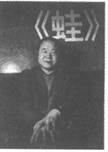题目内容
The boy insisted that he the money and he at once.
A. not steal; be set free B. hadn't stolen; be set free
C. didn't steal; should be set free D. hadn't stolen; set free
B

 名校课堂系列答案
名校课堂系列答案
Neatly putting an emphasis on his storytelling skill is how writer Mo Yan began his Nobel Lecture in Literature speech, “Storyteller”, on Friday (Saturday, Beijing time) in Stockholm.
For 40 minutes he talked about his mother’s 36 on him as a person and a writer, his literary inspirations, and how he 37 with the controversy(争论)that followed the announcement of his Nobel victory.
He told his audience that as a boy he told stories to cheer up his mother, and 38 that poverty and loneliness fueled his imagination as a writer after he grew up. 39 , authors such as William Faulkner and Gabriel Garcia Marquez 40 him, he said, especially their bold and unlimited writing style.
“A person should be 41 in daily life, but follow one’s instinct(本能)and take control when it 42 to literary creation.”
He said the soul of 43 all of his works is the boy in Transparent Carrot who has an almost superhuman ability to bear 44 . He added that he also tried to make his hometown of Gaomi in Shandong Province a microcosm(缩影)of China and even the 45 .
His greatest challenge, he said, was writing novels that deal with 46 realities.
“In writing about the dark aspects of society there is a(n) 47 that emotions and anger allow politics to limit literature.”
He said literature must be 48 on real life but go beyond it.
He also mentioned the 49 surrounding his selection as Nobel winner, saying he was showered with many flowers. 50 he was a target for “stone throwers”.
“At first I thought I was the 51 of the controversies, but over time I’ve come to realize that the real target was a person who had 52 to do with me.”
Mo 53 his lecture by saying he was made to feel like an actor in a play with all the attention he was 54 , but he had decided that the best way to communicate his thoughts was to __55 writing.
| 【小题1】 |
|
| 【小题2】 |
|
| 【小题3】 |
|
| 【小题4】 |
|
| 【小题5】 |
|
| 【小题6】 |
|
| 【小题7】 |
|
| 【小题8】 |
|
| 【小题9】 |
|
| 【小题10】 |
|
| 【小题11】 |
|
| 【小题12】 |
|
| 【小题13】 |
|
| 【小题14】 |
|
| 【小题15】 |
|
| 【小题16】 |
|
| 【小题17】 |
|
| 【小题18】 |
|
| 【小题19】 |
|
| 【小题20】 |
|
I was shopping in the supermarket when I heard a young voice.
“Mom, come here! There’s this lady here my size!”
The mother rushed to her son; then she turned to me to apologize.
I smiled and told her, “It’s okay.” Then I talked to the boy, “Hi, Mickey, I’m Darry Kramer. How are you?”
He studied me from head to toe, and asked, “Are you a little mommy?”
“Yes, I have a son,” I answered.
“Why are you so little?” he asked.
“It’s the way I was born,” I said. “Some people are little. Some are tall. I’m just not going to grow any bigger.” After I answered his other questions, I shook the boy’s hand and left.
My life as a little person is filled with stories like that. I enjoy talking to children and explaining why I look different from their parents.
It takes only one glance to see my uniqueness. I stand three feet nine inches tall. I was born an dwarf (侏儒). Despite this, I did all the things other kids did when I was growing up.
I didn’t realize how short I was until I started school. Some kids laughed at me.. I began to hate the first day of school each year. New students would always stare at me as I struggled to climb the school bus stairs.
But I learned to smile and accept the fact that I was going to be noticed my whole life. I decided to make my uniqueness an advantage rather than a disadvantage. What I lacked in height, I made up for in personality.
I’m 47 now, and the stares have not diminished as I’ve grown older. People are amazed when they see me driving. I try to keep a good attitude. When people are rude, I remind myself, “Look what else I have---a great family, nice friends.”
It’s the children’s questions that make my life special. I enjoy answering their questions. My hope is that I will encourage them to accept their peers (a person of the same age, class, position, etc.), whatever size and shape they come in, and treat them with respect.
【小题1】Why did the mother apologize to the author?
| A.Because the boy ran into the author. |
| B.Because the boy laughed at the author. |
| C.Because the boy said the author was fatter than him. |
| D.Because the mother thought the boy’s words had hurt the author. |
| A.When she grew up. |
| B.When she was 47 years old. |
| C.When she began to go to school. |
| D.When she met the boy in the supermarket. |
| A.Angry. | B.Calm. | C.Painful. | D.Discouraged. |
So________ was the boy in the game he was playing online that he could feel neither sleepy nor hungry.
|
A.hidden |
B.engaged |
C.absorbed |
D.drawn |